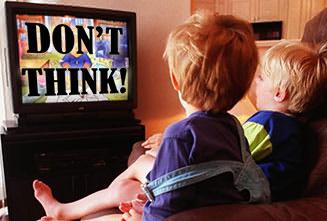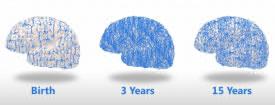TV: Teaching Children Not to Think
November 16, 2013
 The beginning years of life are critical for neural development, and there are a myriad of elements which can contribute in stunting our children’s growth and potential. During the first few years of its life a child’s brain nearly triples in size, connected neurons with each other, keeping the connections it uses more. Early experiences condition the mind, and unused connections get pruned. Many infants today spend between two to five hours a day watching television. Depending on how much television your child is watching, and the quality of the content, it may have a negative impact on their development and skills later in life.
The beginning years of life are critical for neural development, and there are a myriad of elements which can contribute in stunting our children’s growth and potential. During the first few years of its life a child’s brain nearly triples in size, connected neurons with each other, keeping the connections it uses more. Early experiences condition the mind, and unused connections get pruned. Many infants today spend between two to five hours a day watching television. Depending on how much television your child is watching, and the quality of the content, it may have a negative impact on their development and skills later in life.
A new study shows that each hour of television that your toddler watches, damages their vocabulary, math skills, and class engagement years later. The study marks the first time that the direct relationship between television viewing and psychosocial difficulties has been examined. This is just the cherry on top of an overflowing fountain of literature on the topic of how much TV viewing time one should allow their children.
The study followed roughly 2,000 babies from birth on as part of a long term study, finding that even just one extra hour of viewing time alone predicted worse performance later when the child attended kindergarten.

One study found that children around the age of three who spent time watching non-educational programs were found to have attention problems later on around ages four and five. Children were categorized into three groups depending on the content that they were viewing: educational, non-violent entertainment, and violent entertainment. Only children who viewed educational TV before age three were not found to have attentional problems several years later. The findings strengthen the popular notion that TV viewing in early ages of childhood, depending on the amount and content, can play a major role in the development of attention and behavior problems.
Fast-paced cartoons have also been found to negatively influence a child’s executive functioning, such as the ability to delay gratification or exercise sustained effort. It was found that kids who watch fast-paced cartoons perform significantly worse on executive functioning tasks than those who watched a slower-paced show, such as Mr. Rogers. While too much stimulation for the child can be a negative thing, too little can be damaging and cause sensory deprivation as well.
It is hard these days to avoid having our children exposed to television programs, and it is important for parents to sit down and watch the shows that their children are watching in order to understand the type of content that they are being exposed to and talk them about what they are seeing. Children who are exposed to too much over-stimulation can become restless and agitated and display attention deficits when in less stimulating situations, like school. Those who spend more time watching television are also more likely to become overweight, as a study conducted by the Medical Research Institute of New Zealand looked at over 200,000 teenagers and children, results showed that those who spent more time watching television were more likely to be overweight and obese.
Educational programs can be beneficial to our children after three years of age, but exposure to the TV beforehand is most often discouraged by childcare experts. In the debate as to whether television programming trumps hands-on experiences, for the purposes of learning and retention, the latter (actual experience) is arguably more realistic and beneficial in many respects. Some TV shows can educate, inform and inspire, and can be a compliment to their current method of school learning. Children who choose to watch educational and non-violent children’s shows, tend do better on reading and math tests than those who do not watch the programs and were presented no alternatives.
The best way for parents to stimulate the mind of their children is to play with them and interact with them directly: there is no better teacher than direct social experience. People also need to realize that words mean far less than actions, and that what we show them often means more than what we tell them. Thus we have to keep in mind that the TV is showing them things too, and the danger is that many of these things are divorced from reality.
Digital discoveries
- Migliori Casino Online
- Casino Non AAMS
- Siti Casino
- Sites De Paris Sportifs Belgique
- Tous Les Sites De Paris Sportifs Belgique
- Meilleur Casino En Ligne Belgique
- Casino En Ligne Belgique Bonus
- I Migliori Casino Online
- Non Aams Casino
- Scommesse Italia App
- Migliori Casino Online Esteri
- Paris Sportif Crypto Sans Kyc
- Site De Paris Sportif
- Sweet Bonanza Avis
- Paris Sportif Ufc
- オンラインカジノ 出金早い
- Casino Live En Ligne Français
- Site De Paris Sportifs
- Meilleurs Nouveaux Casinos En Ligne
- Casino En Ligne Français
- Casino En Ligne
- Casino Retrait Instantané
- Casino En Ligne Fiable
- Meilleur Casino En Ligne 2026
- Casino En Ligne Retrait Immédiat
- Casino Français En Ligne
- Casino Italia Non Aams
- Casino Con Free Spin Senza Deposito
- Siti Di Scommesse Non Aams
- Migliore Casino Non Aams
- Casino Online Non Aams 2026
- 토토사이트 모음
- Top 10 Trang Cá độ Bóng đá
- Casino En Ligne
- Casino En Ligne France
- Casino En Ligne Argent Réel
- Casino En Ligne Retrait Immédiat 2026
- Nouveau Casino En Ligne 2026








